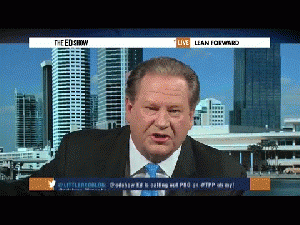On May 23, 2013, Oregon Democratic Senator Ron Wyden pointed out on the floor of the US Senate that a group of corporations -- instead of democratically elected representatives in Congress -- were negotiating the Trans Pacific Partnership (also known as the Southern Hemisphere Asian Free Trade Agreement or SHAFTA). Wyden said:
"It may be the U.S. Trade Representative's (USTR) current job to negotiate trade agreements on behalf of the United States, but Article 1 Section 8 of the U.S. Constitution gives Congress -- not the USTR or any other member of the Executive Branch -- the responsibility of regulating foreign commerce. It was our Founding Fathers' intention to ensure that the laws and policies that govern the American people take into account the interests of all the American people, not just a privileged few.And yet, Mr. President, the majority of Congress is being kept in the dark as to the substance of the TPP negotiations, while representatives of U.S. corporations -- like Halliburton, Chevron, PHRMA, Comcast, and the Motion Picture Association of America -- are being consulted and made privy to details of the agreement.
Wyden went on the point out that, while corporations like Halliburton and Comcast have full access to -- and, in fact, are even writing SHAFTA/TPP -- that as a senior member of Congress who should be involved in the process, he and his staff had been shut out:
"As the Chairman of the Senate Finance Committee's Subcommittee on International Trade, Customs, and Global Competitiveness, my office is responsible for conducting oversight over the USTR and trade negotiations. To do that, I asked that my staff obtain the proper security credentials to view the information that USTR keeps confidential and secret. This is material that fully describes what the USTR is seeking in the TPP talks on behalf of the American people and on behalf of Congress. More than two months after receiving the proper security credentials, my staff is still barred from viewing the details of the proposals that USTR is advancing.
But apparently it's not just US Senators and members of Congress who've been shut out from the TPP/SHAFTA negotiations. The American people have been as well.
Comcast owns a majority stake in NBC's parent company, which itself owns the majority stake in MSNBC. And over at MSNBC, there's only been one person who's been regularly reporting on the TPP/SHAFTA treaty: Ed Schultz.
And now Schultz is gone.
While the network will probably not be as silent on the issue as they have been when we approach the time that the deal has to be made public for 60 days before a congressional vote, odds are the trenchant and insightful analysis -- and critiques of it -- that were regularly made on Schultz's program (mostly by Schultz himself and by labor leader guests and Senator Sanders) will be absent.
Similarly, the trade association that represents Comcast, that National Cable & Telecommunications Association (NCTA), whose past CEO Tom Wheeler is now the chairman of the FCC and whose current CEO is former FCC Chair Michael Powell, has now sued the FCC against their use of Title II of the Telecommunications Act to maintain net neutrality through "common carrier" designation of Internet Service Providers like Comcast.
Schultz also occasionally discussed net neutrality -- as did many hosts before Comcast took over the network in January of 2011. Since then, he's pretty much been the lone voice speaking out against the interests of Comcast and for the interests of Internet users and independent websites.
And now he's gone.
The TPP/SHAFTA and Net Neutrality are two issues on which most of the rest of America's corporate media have been largely silent. They didn't even merit mentioning in recent Republican presidential debates, as the issues don't even exist over in Fox-Land.
Of all the American-owned and operated television networks, the only one that's been giving regular coverage to these two (among many others) vital issues has been Free Speech TV.
(Note: You can view every article as one long page if you sign up as an Advocate Member, or higher).






